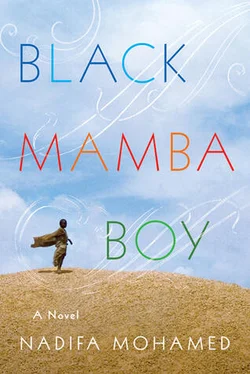They chose Keren, a Muslim town of whitewashed buildings, camel merchants, and silversmiths; it was nestled like a medieval fort in the bosom of a severe mountain range, with only a small gorge for access. The Italians bombed this gorge with more energy and vitality than they had brought to any other activity in the war. They pulled up their imaginary drawbridge and awaited the Scots, Indians, French, Senegalese, Arabs, and Jews who made up the Allied effort against them. Jama and the signalers were called to Keren along with ninety thousand other askaris and were among the last to arrive, it having taken days of marching with blistered feet and nauseating lorry rides to get there.
On the fifteenth of March 1941, the battle began. Ten thousand shells an hour were fired by the British and Italian guns, and even a mile behind the front, Jama’s bones were rattled by explosions. Jama, Shidane, and Abdi trembled as they watched over the valley where Indian and Italian killed each other over African soil. “Ya salam!” exclaimed Shidane every time a British bomb hit the askaris. Everything became more serious: they were finally taught how to shoot, using cans as targets, and Shidane the Fearless, as he started to call himself, became the best shooter among them. The askaris were constantly scrutinized and observed. The British were said to be using northern Somalis as spies, so the Italians kept them away from the fighting while they still could. Trains regularly brought up supplies to the Italians, and Shidane used his quickly established friendships with Somali cooks to obtain delicacies such as chocolate, tinned chicken, tinned peaches, and his new addiction, condensed milk. His pack always rattled with tins of sweet, thick milk, and he charged askaris for the pleasure of a drop in their tea.
While 4th Company guarded a munitions store near town, caravans of refugees trundled past, some on camels, some on mules, and the poorest on foot, weighed down by their children, fleeing as their country was destroyed. Shidane’s enlistment pay was burning a hole in his pocket, so he frittered it away buying refreshing camel’s milk from the camel merchants. As the battle raged over the hills, Jama made binoculars of his hands and watched explosions that gave the mountains the appearance of erupting volcanoes. It seemed to him that the mountains would eventually crumble under the bombardment. Occasionally, 4th Company had to desert the munitions as the RAF flew ominously over, but the British planes sought out more substantial targets; they scored a perfect, deafening hit on a train bringing ammunition to the Italian front line. The train flew off the tracks as the mortars, grenades, and magazines blew up. The driver in the steam engine tried to race away from the burning carriages but was engulfed in a white-hot inferno. Jama watched the man struggling in the flames, he was a beating heart at the center of the fire, dancing and flailing, refusing to give his life up. It was the most courageous thing Jama had seen in this war.
The boys listened for the roar of the British airplanes, and waited impatiently for the next humiliation to be meted out against the Italians. On the one day it seemed that their signaling would be finally put to use, they looked up eagerly to the sky to see eight Italian planes in formation above them; but they were quickly attacked by three British Hurricanes. In the ensuing dogfight three of the Italian planes crashed one after the other into a valley and the other five limped away. It was so exciting that the Eritrean bulabasha pulled out his whip to quieten the boys. Jama was the first to become afraid of the bombers and began to tie twigs onto his head so the planes could not see him from above. Shidane and Abdi humored him, competitively adding to the foliage until they resembled walking bushes, their faces lost behind veils of leaves.
Every night the British would halt their bombardment for ten minutes to play caterwauling Italian opera on their loudspeakers followed by summaries of all the defeats the Italians had suffered that day. After the Italian-language segment, Eritreans and Somalis working for the British would take control of the microphone and translate the news, exhorting the askaris to desert, offering them rewards and medals if they did so. The askaris did not need much encouragement. Every night under the cover of darkness, thousands crept away, never to be seen again. All the Amhara disappeared when the British reported that Haile Selassie had returned from exile and Abyssinian patriots were pressing on to Addis Ababa. Ogadeni Somalis returned to their families and camels when leaflets were dropped on their heads, reporting that rebellion was brewing in Hararghe. Saturn and Mars had slid into conjunction, and the nomadic Somalis saw that a great defeat lay before the Italians and left before the stars punished them, too. That left a hodgepodge of Eritreans and young urban Somalis who used the leaflets to wipe their bottoms. From the ninety thousand askaris who had been present at the start of the battle for Keren, sixty thousand remained. The Italians tried to keep these obedient by shooting deserters or tying hands and feet behind backs and throwing insubordinate men into mountain gullies where jackals waited for them. The Italians also reprised one of their special forms of execution: they tied mutinous askaris, usually nomadic Somalis unused to taking orders, to the backs of lorries and accelerated along the rough road until there was nothing left on the end of the rope apart from a pair of manacled hands. One askari showed Jama and the boys a postcard he had bought from a hawker in Mogadishu. They squinted at the picture of the lorry, unable to see anything of interest. “Allah,” shouted Abdi, and he pointed to the shackled hands that hung off the back, piously cupped as if in prayer, but the wrists were shredded stumps, inscribing their curses in bloody script on the dusty road.
“Where’s the rest of them?” asked Jama.
“Probably still along the roadside,” said the askari, taking back his postcard.
Every askari returned from the front line with tales of the daily carnage, the lack of sleep, dead bodies exploding in the heat, men going mad with shellshock, the evil ways in which the Italians humiliated their black comrades.
“The lieutenant told me to bury the white bodies but to leave the black to rot. I couldn’t believe it, we had all just sacrificed our fucking lives for them,” raged one Eritrean askari. “When I said I would bury them all together, he raised his pistol to me.”
Jama, Abdi, and Shidane listened to these stories at night around the campfire. “Let’s stay until we have earned enough money to travel to Egypt,” Jama agreed. They hadn’t yet seen the violence and savagery of the war close up and still believed they could escape it altogether. At night, the askaris pooled their flour rations and cooked together. Shidane usually commandeered the pots and pans to make lahoh and surprisingly delicious stews with stolen cooking oil and spices.
“My mother is the best cook in Aden, she doesn’t make the sloppy bowls of grease you people are used to,” he boasted.
They crouched down around the fire and burned their fingers trying to get to the stew before the others. Even if bombing sorties flew overhead, the men would rather stay put in the open than risk missing out on Shidane’s cooking. Some jittery ones would be half standing, half crouched, nibbling the sour bread between shaking fingers. A man jumped out of his skin as a munitions store exploded, and put his foot right into the boiling pot. The askaris jumped up in a rage.
“Waryaa fulay! Hey, coward! Look where you’re stepping, get your dirty feet out of our food!” the boys shouted at him with no concern for the red, scalded foot he pulled out of the cauldron.
Читать дальше
Конец ознакомительного отрывка
Купить книгу












